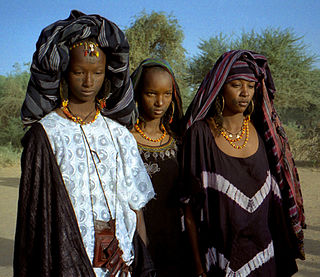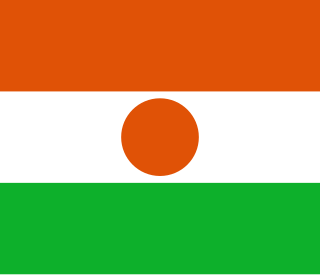
This article is about the demographic features of the population of Niger, including population density, ethnicity, education level, health of the populace, economic status, religious affiliations and other aspects of the population.

The Niger River is the principal river of West Africa, extending about 4,180 km (2,600 mi). Its drainage basin is 2,117,700 km2 (817,600 sq mi) in area. Its source is in the Guinea Highlands in southeastern Guinea. It runs in a crescent through Mali, Niger, on the border with Benin and then through Nigeria, discharging through a massive delta, known as the Niger Delta or the Oil Rivers, into the Gulf of Guinea in the Atlantic Ocean. The Niger is the third-longest river in Africa, exceeded only by the Nile and the Congo River. Its main tributary is the Benue River.

The Niger–Congo languages constitute one of the world's major language families and Africa's largest in terms of geographical area, number of speakers, and number of distinct languages. It is generally considered to be the world's largest language family in terms of distinct languages, ahead of Austronesian, although this is complicated by the ambiguity about what constitutes a distinct language; the number of named Niger–Congo languages listed by Ethnologue is 1,540.

Niamey is the capital and largest city of the West African country of Niger. Niamey lies on the Niger River, primarily situated on the east bank. It is an administrative, cultural and economic centre. Niamey's population was counted as 978,029 as of the 2012 census; the Niamey Capital District, covering 670 km2, had 1,026,848 people. As of 2017, population projections show the capital district growing at a slower rate than the country as a whole, which has the world's highest fertility rate.

Benue–Congo is a major subdivision of the Niger–Congo language family which covers most of Sub-Saharan Africa. It consists of two main branches:
The Niger national football team represents Niger in international association football through the Nigerien Football Federation, a member of Confederation of African Football (CAF). Niger plays in the colors of the flag of Niger, white, green and orange. Their nickname comes from the Dama gazelle, native to Niger, the Hausa name of which is Meyna or Ménas The Dama appears on their badge in the colors of the national flag.

Maradi is the second largest city in Niger and the administrative centre of Maradi Region. It is seat of the Maradi Department and an Urban Commune.

The current conflict in the Niger Delta first arose in the early 1990s over tensions between foreign oil corporations and a number of the Niger Delta's minority ethnic groups who feel they are being exploited, particularly the Ogoni and the Ijaw. Ethnic and political unrest has continued throughout the 1990s despite the conversion to democracy and the election of the Obasanjo government in 1999. Competition for oil wealth has fueled violence between ethnic groups, causing the militarization of nearly the entire region by ethnic militia groups, Nigerian military and police forces, notably the Nigerian Mobile Police. The violence has contributed to Nigeria's ongoing energy supply crisis by discouraging foreign investment in new power generation plants in the region.

There are over 500 native languages spoken in Nigeria. The official language of Nigeria is English, the former language of colonial British Nigeria. As reported in 2003, Nigerian English and Nigerian Pidgin were spoken as a second language by 60 million people in Nigeria. Communication in the English language is much more popular in the country's urban communities than it is in the rural areas, due to colonisation.
The Ijawlanguages, also spelt Ịjọ, are the languages spoken by the Ijo people in southern Nigeria.

The Volta–Niger family of languages, also known as West Benue–Congo or East Kwa, is one of the branches of the Niger–Congo language family, with perhaps 50 million speakers. Among these are the most important languages of southern Nigeria, Benin, Togo, and southeast Ghana: Yoruba, Igbo, Bini, Fon, and Ewe.
Nigeria became an independent country on 1 October 1960 and in 1963 became the Federal Republic of Nigeria. The republic instituted two orders of merit: the Order of the Niger and the Order of the Federal Republic.
Nigeria Olympic football team represents Nigeria in international football competitions in Olympic Games. The selection is limited to male players under the age of 23, except during the Olympic Games where the use of three overage players is allowed. The team is controlled by the Nigeria Football Federation.

Tidjani Amadou Moutari Kalala is a Nigerien international footballer who plays for Hungarian club Budapest Honvéd, as a midfielder.

The Niger national basketball team represents Niger in international competitions. It is administrated by the Fédération Nigérienne de Basket-Ball (FENIBASKET).

The Tongo Tongo ambush or simply the Niger ambush occurred on 4 October 2017, when armed militants from the Islamic State in the Greater Sahara (ISGS) attacked Nigerien and U.S. soldiers outside the village of Tongo Tongo, Niger while they were returning to base after a stop in the village. During the ambush, five Nigeriens, four U.S. soldiers, and at least 21 ISGS militants were killed and eight Nigeriens and two U.S. soldiers including the team commander were wounded. In the day preceding the ambush, the Nigerien and U.S. soldiers conducted a mission attempting to locate and capture or kill Doundou Chefou, a commander in the ISGS.

The 2019 Africa U-20 Cup of Nations was the 15th edition of the Africa U-20 Cup of Nations, the biennial international youth football tournament organized by the Confederation of African Football (CAF) for players aged 20 and below. In May 2015, it was decided that the tournament would be hosted by Niger.

















